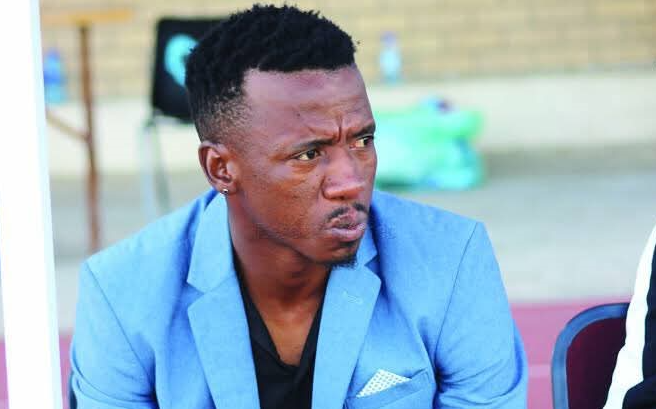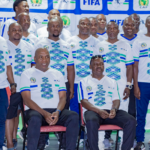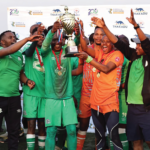The Vodacom Premier League (VPL) is increasingly becoming a lucrative destination for South African (SA) coaches, who are leading some of the country’s top clubs and sometimes using the platform as a stepping stone to bigger things.
This notable trend has this year alone, seen at least three of the country’s elite Premier League clubs appointing SA tacticians at the helm, drawn by competitive packages and the promise of international exposure that can enhance their coaching credentials.
The most recent of these appointments came just last week, when Linare Football Club unveiled former Mamelodi Sundowns and Moroka Swallows midfielder Jabulani ‘S-Curl’ Mendu as their new head coach.
The 48-year-old Mendu, who holds a CAF A Licence, brings with him a reputation for tactical discipline and a long-passing style that made him a household name during his playing days. Linare expressed their confidence in Mendu’s leadership in an official statement:
“We are excited to introduce our new head coach, Jabulani ‘S-curl’ Mendu, with experience and a proven track record of success. Coach Mendu brings a wealth of knowledge and passion to our team,” the club said.
“Under coach Mendu’s leadership, we are committed to developing talented players, building a strong team culture, and achieving victory on the field.”
Linare’s decision to invest in a South African coach follows a precedent set in November 2020, when they appointed former Orlando Pirates tactician Teboho Moloi, signaling the club’s willingness to offer competitive packages to attract quality foreign expertise.
This growing trend, driven by clubs’ financial capacity to offer attractive terms, also saw Lioli FC appoint Bongani Maseko last month, who immediately made his mark by guiding Tse Nala to victory in the inaugural T.J. Nthane Foundation Tournament, beating Linare 2–0 in the final.
Similarly, Lijabatho FC has recently appointed former Bantu FC head coach James Madidilane, another SA coach, who previously tasted success in Lesotho’s top flight by winning back-to-back league titles and participating in continental competitions.
These success stories continue to attract more South African coaches seeking both career advancement opportunities and to some extent financial rewards.
For other SA coaches, Lesotho is emerging as a strategic launching pad that offers better recognition than development leagues back home. After gaining experience and building their profiles here, some move on to more prestigious roles elsewhere, having enhanced their market value through international experience.
One example is Morena Ramoreboli, who once coached Lioli FC and now serves as the interim head coach for Botswana’s senior national team, The Zebras. His current mission is to qualify for the 2025 Africa Cup of Nations (AFCON).
Prominent sports journalist Tebalo Lebajoa explains this dynamic; “Most of the SA coaches in Lesotho come here to build their CVs. They usually come from development leagues in South Africa, and if they perform well here, they gain the international exposure they need to return home or move to other leagues with better opportunities.”
Lebajoa further highlighted that the local league offers fewer barriers to growth and better financial prospects for foreign coaches compared to South Africa’s cutthroat environment, where even a CAF A licence may not guarantee recognition or adequate compensation.
“In South Africa, coaches with CAF A licenses often compete with unqualified ex-players. It is easier for them to stand out and get noticed in Lesotho,” he said, adding that the financial packages available in Lesotho often exceed what these coaches could earn in South African development leagues.
Implications for homegrown coaching talent
While the influx of foreign expertise brings new perspectives, it also raises questions about the opportunities afforded to local coaches who cannot compete with the attractive packages offered to their South African counterparts.
The Secretary General of the Lesotho Football Association (LeFA) acknowledged this concern in an exclusive interview with Newsday.
“We have trained many local coaches under CAF licensing, but very few have shown the strength to handle big clubs. It is no surprise that club bosses are increasingly turning to foreign coaches,” he said.
The LeFA official admitted that while foreign coaches have improved discipline and competitiveness in clubs, there are risks of marginalising local coaches, especially with the growing trend of appointing foreign assistant coaches who command higher salaries.
“If we are not careful, local coaches will find themselves completely sidelined. We must regulate this trend before it takes an unpalatable turn.”
Balancing benefits with integrity
Foreign coaches have played a role in improving professionalism and discipline among local players, justifying the financial investment clubs make in their services. According to Lebajoa, their distance from players allows them to enforce stricter standards—something local coaches often struggle with due to personal ties within teams.
However, concerns are growing about system manipulation, with accusations of foreign coaches influencing club bosses to illegally register ineligible players as locals, potentially compromising the integrity that makes these lucrative opportunities possible.
“We have had cases of players allegedly born in hospitals that never existed, or with dual birthplaces. These abuses must be curbed before they damage the integrity of our game,” warned the LeFA SG.
A call for sustainable development
While foreign coaches undeniably bring value that justifies their attractive packages, stakeholders agree that the long-term growth of Lesotho football requires a dual approach, leveraging international experience while uplifting local coaching talent to eventually compete for these lucrative positions.
“Our local coaches must improve their professionalism and learn from these expatriate mentors. Football is a continuous classroom, and our coaches must be willing students.”
Lebajoa echoed these sentiments, urging LeFA to facilitate partnerships between international and local coaches, increase the number of foreign players allowed per club, and create pathways for local players to gain international exposure.
“The presence of foreign coaches and players creates healthy competition. Our players need to fight for their place, and that will naturally raise the level of our football,” Lebajoa concluded.
Summary
- The Vodacom Premier League (VPL) is increasingly becoming a lucrative destination for South African (SA) coaches, who are leading some of the country’s top clubs and sometimes using the platform as a stepping stone to bigger things.
- Linare’s decision to invest in a South African coach follows a precedent set in November 2020, when they appointed former Orlando Pirates tactician Teboho Moloi, signaling the club’s willingness to offer competitive packages to attract quality foreign expertise.
- It is easier for them to stand out and get noticed in Lesotho,” he said, adding that the financial packages available in Lesotho often exceed what these coaches could earn in South African development leagues.

Seabata Mahao is a general news reporter with special focus on Business and Sports. Started working at Newsday in 2021. Working in a team with a shared goal is what I enjoy most and that gives me the motivation to work under any environment leading to growth.









